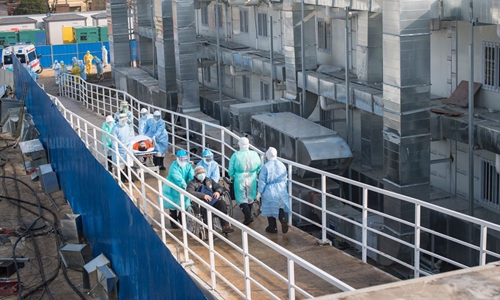HOME >> CHINA
Feb 21 maybe peak day for coronavirus outbreak: Yale expert
By Zhao Juecheng and Liu Caiyu Source:Global Times Published: 2020/2/4 19:13:41

Medical workers help the first batch of patients infected with the novel coronavirus move into their isolation wards at Huoshenshan (Fire God Mountain) Hospital in Wuhan, central China's Hubei Province, Feb. 4, 2020. (Xinhua/Xiao Yijiu)
February 21 could be a turning point in the ongoing coronavirus outbreak, a public health expert from Yale University predicted in an exclusive interview with the Global Times.
Latest official data showed 3,235 new patients were confirmed as having the virus on Monday night, compared with 2,829 cases a day before, bringing the total number to surpass 20,000. The rapid increase in the confirmed diagnoses means that the epidemic is moving towards its peak, which is of utmost concern.
Renowned Chinese respiratory scientist Zhong Nanshan told the media on Sunday that the outbreak is expected to peak in the next 10 days to about two weeks, which means the peak period will occur between February 12-16.
Chen Xi, an assistant professor of public health at Yale University, who has been engaged in the research into the epidemic with his colleagues, told the Global Times that the outbreak will reach its peak on February 21.
Meanwhile, Jonathan Read, an epidemiologist at Lancaster University in the UK, estimated the spread of the outbreak will hit its summit on February 26.
But Chen admitted all predictable models have limitations, and no model can cover all factors, pointing out that viral infectivity, for example, is hard to predict.
Some scholars believe that the virulence of the virus decreases generation by generation while others assume the epidemic will eventually turn into a flu.
The Chinese government's efforts in fighting the coronavirus have also helped control the spread of the outbreak, which is another unpredictable factor, Chen said. According to Chen, a yet-to-be published thesis shows the basic reproduction number (R0) of the virus decreased by 30 percent after Wuhan, the epicenter of the disease, went under lockdown.
The increased availability of test kits may also lead to a growing number of confirmed patients in China, Chen stated. About 773,000 kits have been produced per day since Saturday and the daily output of diagnostic kits for the novel coronavirus reached 40 times more than the number of patients suspected of contracting the virus, the Ministry of Industry and Information Technology announced on Monday.
Even though many have conducted research into the coronavirus, viral prediction is not that reliable, Chen said, noting that the source of the infection is yet to be confirmed.
The origin of the virus directly impacted the number of the first generation infected. More reports are showing that the Huanan seafood market in Wuhan was not the only origin of the virus.
Some suggest inspecting the sewer system in Wuhan, capital of Hubei Province as a virus could spread across the city if bat feces carrying the coronavirus are detected.
Chen noted that if the initial viruses are detected across the city, that would mean a larger number of first generation infected people, along with a stronger virulence and higher death rate.
If the Huanan seafood market is the only source, more patients will have been infected due to the second, third and fourth generation transmission, so the mortality will be lower, Chen said.
Posted in: SOCIETY